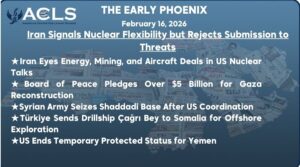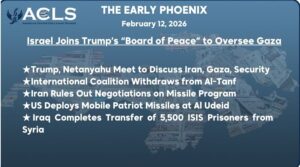By Rania Kisar
======================
★ ISRAEL & PALESTINIAN TERRITORIES
In the span of just three days, from January 5th to 8th, 2024, the already volatile situation between Israel and Hamas has escalated dramatically, revealing not only the intensification of military conflict but also exposing the fissures within Israeli politics and the broader implications for international law and humanitarian concerns.
On January 5th, the Israeli military operation in Gaza marked a significant increase in intensity. Ground forces, supported by the Israeli Air Force, commenced a concentrated assault on Khan Yunis, a known Hamas stronghold in the southern part of Gaza. This operation targeted approximately 30 significant sites, including underground facilities believed to be integral to Hamas’s military infrastructure and numerous weapon warehouses. The strategic importance of these targets cannot be overstated; they represent a concerted effort by the Israeli forces to cripple Hamas’s operational capabilities.
The following day, January 6th, saw further developments in the military front. Israeli troops engaged in ground operations discovered and subsequently destroyed a vehicle heavily loaded with weapons. This vehicle, linked to Hamas terrorists, was likely intended for a significant offensive operation against Israeli targets. In a separate but equally critical operation, an Israeli fighter jet struck a warehouse in central Gaza. This facility was not just any storage unit; it housed long-range missiles, posing a direct threat to Israeli cities and potentially altering the strategic balance in the conflict.
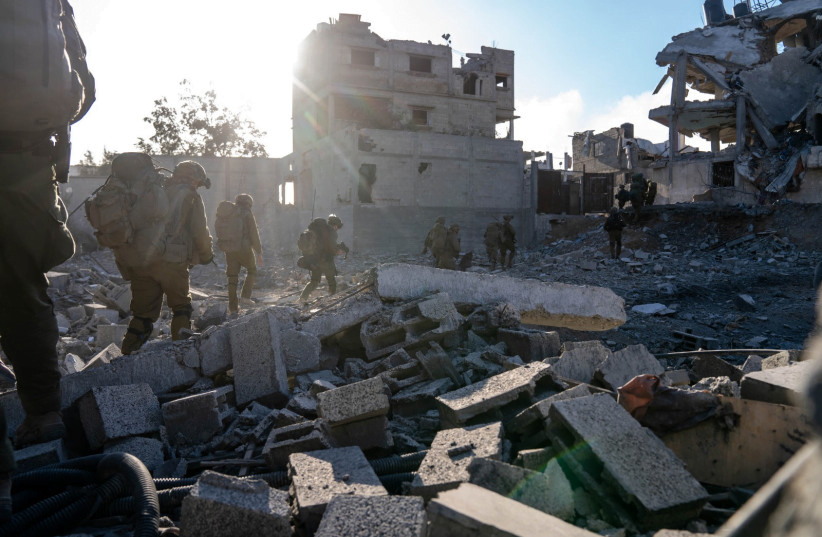
The uncovering of a document detailing Hamas’s indoctrination of children in jihad values was more than a symbolic find. It was a stark reminder of the deep-rooted ideological warfare that underpins this conflict, adding a layer of complexity to the military actions on the ground.
January 7th brought to light the international dimensions of this conflict. The Israeli Defense Forces (IDF) found evidence of Iran’s role in aiding Hamas, specifically in the construction of precision-guided missiles. This discovery was made in a 330-foot terror tunnel in Gaza City, revealing not just Iran’s support in terms of funding and intelligence but also in the provision of weapons and technology. This external involvement by Iran is a significant escalation in the conflict, adding a layer of international intrigue and potentially broadening the scope beyond the immediate geographic confines of the Israeli-Hamas clash.
The IDF discovered and destroyed multiple rocket launchers in Beit Lahiya, northern Gaza, used to target Ashkelon. Additionally, they eliminated four Nukhba terrorists in an airstrike and located a weapons facility and tunnels. A temporary ceasefire was announced to facilitate humanitarian aid in southern Gaza.
The Israeli Air Force conducted intense attacks in Khan Yunis, Gaza, as Defense Minister Gallant vowed to continue operations. Palestinian media reported these airstrikes.
In Jenin, an Israeli soldier was killed and three others injured by a roadside bomb. Concurrently, an Israeli helicopter airstrike killed six Palestinians during a raid. This operation was part of Israel’s response to escalating violence and perceived loss of Palestinian Authority control in the northern West Bank. The IDF announced the elimination of Ismail Siraj, Hamas’ Nuseirat Battalion Commander, and his Deputy, Ahmed Wehbe, in an airstrike. This operation targeted leaders involved in attacks against Israel, including the October 7th terror attack on Kibbutz Be’eri. Siraj and Wehbe played significant roles in Hamas’ military actions.
Parallel to these military developments, the political landscape within Israel was undergoing its own turmoil. Israeli Knesset member Ofir Kassif of the Democratic Front for Peace and Equality vociferously criticized his own government. His accusations were severe, labeling the government’s actions as tantamount to ethnic cleansing and genocide. Kassif’s bold move to sign a petition supporting South Africa’s lawsuit against Israel in the International Court of Justice, and demanding an immediate ceasefire in Gaza, was a clear indicator of the deep divisions within Israeli society and politics. His call for a moral community, free from wars of revenge or extermination, was a poignant reminder of the internal struggle within Israel regarding its approach to the conflict.
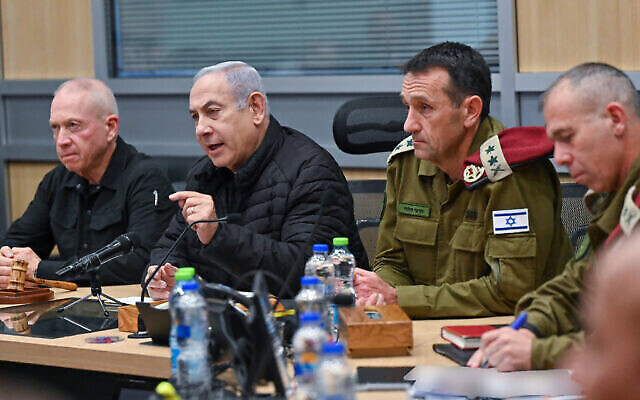
Finance Minister Bezalel Smotrich, known for his extremist views, further inflamed the situation by calling for Jewish settlement in Gaza and the West Bank. He labeled the residents as threats, a statement that not only heightened tensions within the government but also risked escalating the conflict on the ground.
The internal disagreements within the Israeli government reached a crescendo during a high-level meeting to discuss Gaza’s post-war strategy. This meeting, involving senior ministers and military leaders, devolved into chaos and anger. The target of this ire was predominantly IDF Chief of Staff Herzi Halevy, who had initiated an investigation into the military’s handling of the October 7 Hamas attack. The timing of this investigation, amid the ongoing conflict, and the inclusion of former Defense Minister Shaul Mofaz, a known figure for his role in the 2005 Gaza withdrawal, were the main points of contention. Defense Minister Yoav Gallant and former Chief of Staff Benny Gantz stood in defense of Halevy, emphasizing the investigation’s professionalism. This incident underscored the deep-seated tensions within the Israeli political and military echelons, particularly regarding policies towards the Palestinians.
South Korea’s intelligence agency confirmed that Hamas is using North Korean weapons in Gaza, as reported by Yonhap and Voice of America, which included photographic evidence of a grenade launcher with Korean writing. This follows suspicions of North Korean involvement in the conflict since an October 7 attack, though North Korea denies these allegations.
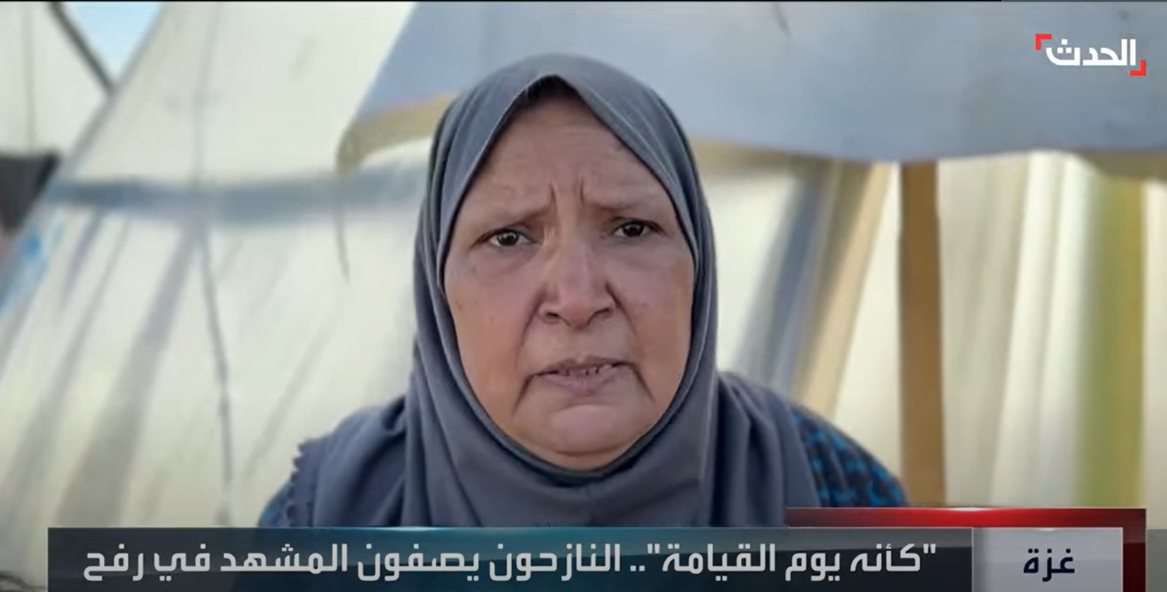
The humanitarian situation in Gaza is becoming increasingly dire. The United Nations has warned that living conditions in Gaza are approaching uninhabitability. The escalation of the conflict has led to substantial civilian casualties and widespread destruction, raising serious humanitarian and legal concerns. A must-watch video report showing Gazans reaching the Rafah borders near Egypt, coming from both north and south Gaza, is truly heartbreaking. Women, unafraid of repercussions, have called for an immediate halt to the war from Hamas. “Rafah is as congested as the Day of Judgment,” cried one of the mothers. Rafah, only 60 km away, is reported to now be congested up to four times its capacity, currently housing more than 1.3 million people, with an average of sixteen people per square meter. An older lady made millions of Arabs cry when she begged for a dignified life without terrorism. Although she did not call out any specific entity for terrorism, her subsequent question about the final results of all that has happened was clearly understood to be addressing Hamas.
The Islamic Resistance in Iraq claimed responsibility for striking Haifa, Israel, with an upgraded Al-Arqab cruise missile and targeting American bases in Syria and Iraq. This includes drone attacks on the Qasrok base in Hasakah and a military site in the Golan Heights. They aim to intensify attacks on American bases in response to Israeli actions in Gaza, supported by the U.S. and Europe, where continuous airstrikes have resulted in significant Palestinian casualties and infrastructural damage.
In summary, the period from January 5th to 8th, 2024, has been marked by a dramatic escalation in the Israel-Hamas conflict. Israeli military operations have focused on dismantling Hamas’s military capabilities in Gaza, revealing the involvement of external actors such as Iran. Internally, the Israeli government is grappling with significant political disagreements, highlighting the complexities of forming a unified national strategy. Internationally, the conflict has attracted the attention of global powers and international legal bodies, reflecting the far-reaching implications of this localized conflict. As the situation continues to evolve, the focus remains not only on the military and political dimensions but also on the worsening humanitarian crisis in Gaza.
======================
★ IRAN

In a significant first, Iran and the US have jointly confirmed ISIS’ responsibility for the twin bombings at General Qasem Soleimani’s memorial. This tragic event resulted in at least 84 deaths, including 9 children, and nearly 300 injuries. In response, Iran’s judiciary announced the arrest of 32 individuals linked to the attack, uncovering 16 bombs in Kerman province and apprehending 23 ISIS terrorists over recent months. Following these events, Iran’s cyber agents targeted citizens who criticized Soleimani, which prompted a counter-campaign against these activities.
These internal dynamics of Iran’s turmoil were brought into sharp focus with the execution of Mohsen Saravani, a 24-year-old close adviser to the Ayatollah and law student, ordered by Supreme Leader Ali Khamenei. Accused of espionage for Mossad, Saravani’s initial acquittal was followed by a re-arrest. His confession, allegedly extracted under torture, was a key piece of evidence against him. 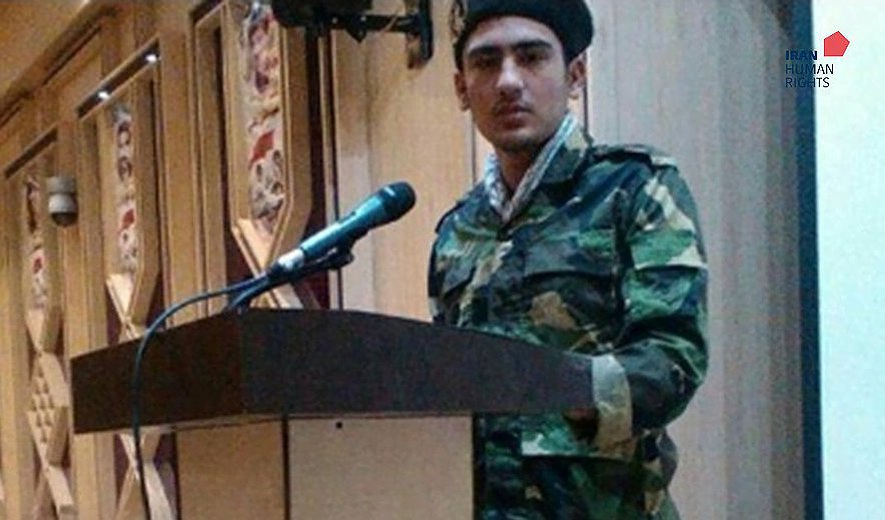 Saravani’s close ties within the Iranian leadership and access to sensitive information had raised suspicions, underscoring the government’s fears of infiltration. This execution serves as a stark warning, emphasizing the regime’s readiness to take extreme measures against perceived threats to national security.
Saravani’s close ties within the Iranian leadership and access to sensitive information had raised suspicions, underscoring the government’s fears of infiltration. This execution serves as a stark warning, emphasizing the regime’s readiness to take extreme measures against perceived threats to national security.
Simultaneously, Iran’s military advancements have drawn attention. Hussain Salamah, chief of the IRGC, recently reiterated threats of a full-fledged regional war against Iran’s enemies. The induction of the Abu Mahdi al-Muhandis warship and new speed boats into the Islamic Revolution Guards Corps (IRGC) Navy marks a notable step in Iran’s naval enhancement, despite its continued challenges. Questions arise about the operational effectiveness of this warship, especially its claimed radar-evading capabilities and 2,000 nautical mile stealth range. Given the advanced surveillance technologies of potential adversaries, the effectiveness of these features is uncertain. Moreover, the rapid development and construction timeline of fifteen months for the warship suggests that there could be potential oversights in its design and testing, which might affect real-world performance.
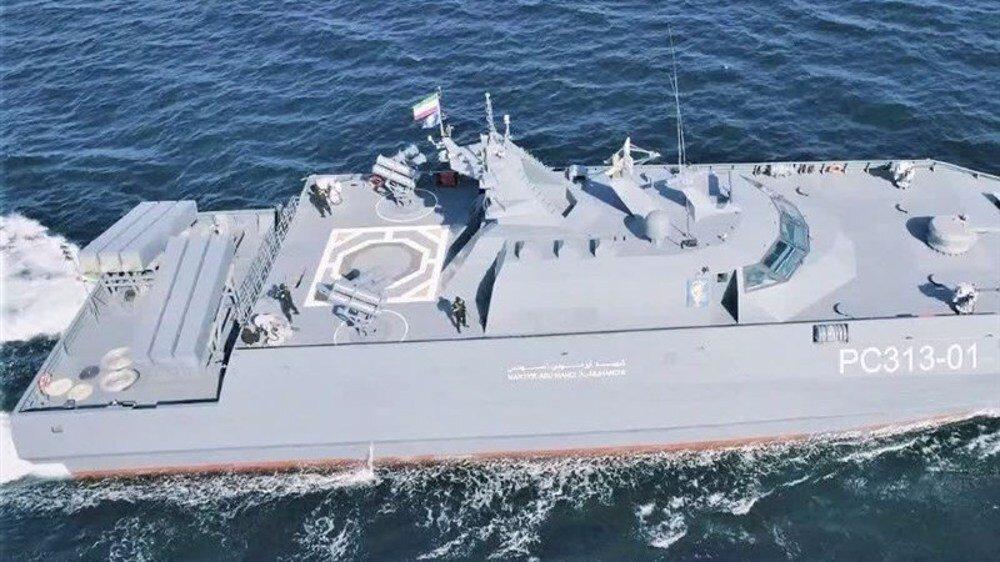
The IRGC’s focus on fast-attack vessels like the Tareq-class and Ashura-class ships, now equipped with Kowsar missiles and advanced radar systems, indicates a strategy prioritizing speed and agility. However, these attributes may not fully compensate for limitations in firepower and defense against advanced air and missile threats from technologically superior navies. The combat efficacy of Iran’s latest naval additions, especially against well-equipped adversaries, remains to be proven. This sentiment echoes the assessment of Admiral Gary Roughead, former U.S. Navy Chief, who described Iran’s naval power as “sad.”
Further increasing challenges for the Mullah government emerged today January 8, 2024 as a fire at a Revolutionary Guards base in southern Iran, reported by the Israeli newspaper Maariv, resulted in damage to 16 ships. This incident, described as a “mysterious explosion,” adds to the heightened tensions in the region. Video footage showed several ships ablaze, with thick smoke at the site. Despite the damage, many ships reportedly left unscathed. Unverified reports suggest that these ships were intended to assist the Houthis in Yemen, who have been attacking ships in the Red Sea in response to Israel’s actions in Gaza.
In the political arena, Iran continues to face challenges and questions about its true military, political, and international power. Brigadier General Iraj Masjedi, a top advisor to the chief commander of the IRGC Quds Force, vowed to support Resistance forces until the total annihilation of the Zionist regime. During a commemoration ceremony for Lieutenant General Qassem Soleimani, Masjedi asserted Iran’s commitment to defending Palestinian rights and supporting resistance against Israel, highlighting the capability of Palestinian resistance forces in recent conflicts.
In conclusion, the unfolding events offer a stark insight into Iran’s current state, a delicate balance between internal security efforts, regional military advancements, and intricate political tactics. Yet, beneath this veneer, Iran essentially emerges as a ‘paper tiger’, engaging in twisted and misleading propaganda. Continually bluffing in the geopolitical arena, it’s widely believed, especially by experts and regional observers, that these deceptions will remain unchallenged, at least during the tenure of the current American administration.
======================
★ LEBANON
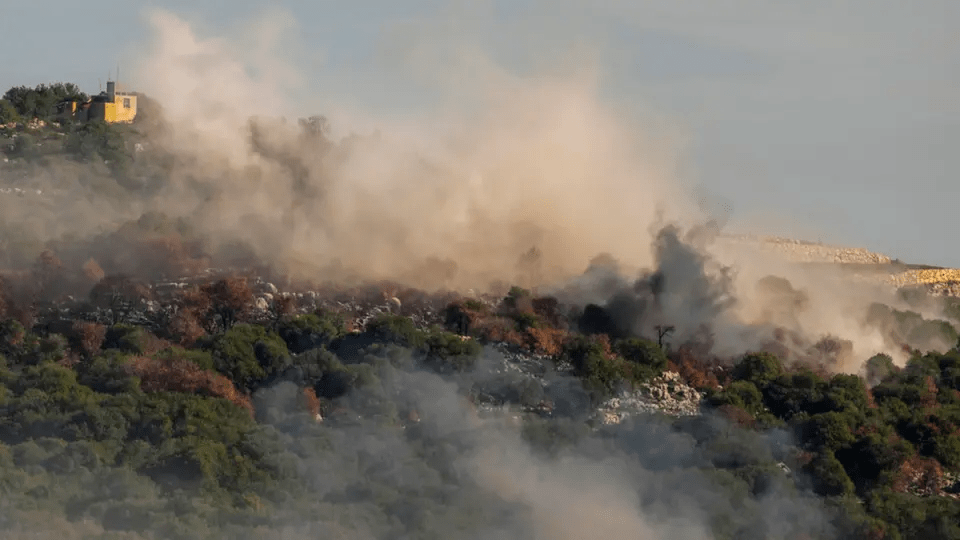
On Monday, the Jewish News Syndicate reported that terrorists in Lebanon fired an anti-tank missile at Kiryat Shmona, Israel, without causing injuries. Israel responded with airstrikes on Hezbollah sites in Lebanon, including a terror compound and rocket launch site. These actions follow Hezbollah’s rocket attacks on Israel as a retaliatory move for the assassination of Hamas leader Saleh al-Arouri in Beirut. Israeli Prime Minister Netanyahu warned Hezbollah, emphasizing Israel’s determination to defend its citizens. U.S. Secretary of State Blinken is visiting the Middle East amid these escalating tensions.
Hot Off the Press, Israeli Strike Kills Top Hezbollah Military Leader.
On Monday, January 8, 2024, an Israeli airstrike in southern Lebanon resulted in the death of Wissam Al-Tawil, a high-ranking official in Hezbollah’s Radwan Division. The attack, targeting Al-Tawil’s vehicle on Dabsha Road in Khirbet Selm, approximately 11 kilometers from the Israeli border, claimed two lives. Al-Tawil played a pivotal role in overseeing Hezbollah’s operations in southern Lebanon. Broadcast by Al Hadath channel, images linked Al-Tawil with Qasem Soleimani, underscoring his significant rank within Hezbollah. This incident is a continuation of the ongoing regional tensions, marked by increased cross-border conflict and its implications for U.S. efforts to stabilize the broader Middle East.
Global efforts as of Sunday evening January 7, 2024 are intensifying to mitigate the rising conflict between Israel and Hezbollah, Iran’s key ally in Lebanon. This surge in diplomatic activity follows an Israeli military operation resulting in the death of Hamas leader Saleh Arourri. However, it is not sure that Israel is actually increasing its preemptive strikes against threats on its northern borders. The Israeli military actions in Lebanon do not seem to be baseless or not urgent, otherwise,
Iranian media sources report that Hezbollah launched a barrage of 62 missiles targeting Israel’s Meron Aerial Surveillance Base. Israeli defense mechanisms successfully identified approximately 40 missile launches emanating from Lebanese territory. The Israel Defense Forces (IDF) acknowledged damage to their air traffic control base on Mount Meron following a Hezbollah missile attack. The strike, in response to the Israeli killing of Hamas leader Saleh al-Arouri, saw over 40 rockets and missiles hit the base, damaging two radar domes. Despite the damage, the base continues operating on backup systems. IDF retaliated with airstrikes on Hezbollah compounds in Lebanon, escalating the conflict and impacting civilians and soldiers on both sides.
In a strategic shift, Israel has proactively extended its defensive military operations by 25 kilometers into Lebanese territory. Israeli defense experts, in statements to Al Hadath Channel, have emphasized that Israel’s immediate focus remains on neutralizing threats emanating from the Gaza Strip.
Joseph Borrell, the European Union’s Foreign Policy Chief, embarked on a crucial two-day visit to Lebanon leading a diplomatic mission aimed at de-escalating the increasingly volatile situation. Concurrently, Israeli Prime Minister Benjamin Netanyahu, in dialogue with Amos Hochestin, the U.S. special envoy, reaffirmed Israel’s determination to transform the security dynamics along its northern Lebanese border. This stance is seen as a pivotal measure to safeguard the well-being of over 100,000 Israeli residents in the vicinity.
Hezbollah responded to the diplomatic efforts aimed at preventing a devastating war in Lebanon with a speech by Mohammad Raad, a member of Nasrallah’s inner circle and head of ‘The Loyalty to the Resistance Bloc’ in the Lebanese Parliament. Raad declared Hezbollah will not offer awards to anyone, meaning the international actors. He warned that if Israel wages war against Lebanon, Hezbollah is prepared to fight to the end. Raad stated they are refusing any concessions and urged nations supporting Israel to instead improve relations with regional actors.
Lebanese political analysts, as reported in various media outlets, have raised serious concerns regarding Hezbollah’s overwhelming influence over Lebanon’s decision-making processes. This dominance, which seemingly sidelines the roles of both the government and the parliament, is viewed as a potential impediment to the success of any diplomatic negotiations.
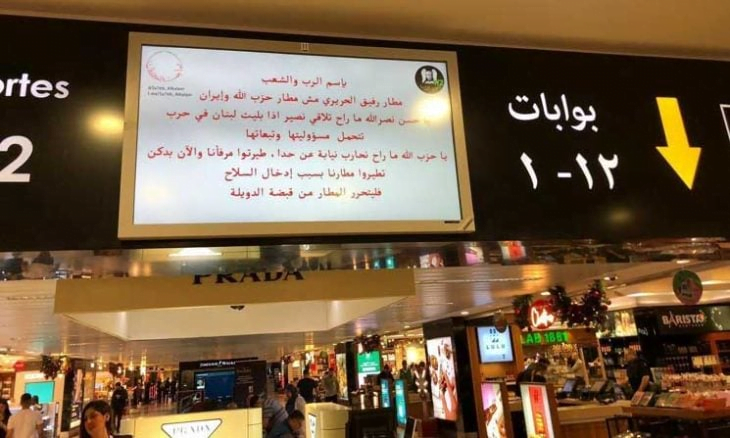 Rafic Hariri International Airport, January 7, 2024
Rafic Hariri International Airport, January 7, 2024
In a related incident underscoring the internal strife within Lebanon, Beirut’s airport information screens were compromised in a cyber-attack. A politically charged message criticizing Hezbollah and Iran was broadcast across the airport’s screens, leading to an emergency shutdown by security personnel. While preliminary investigations leaned towards an inside job, considering the non-internet-connected nature of the affected systems, Lebanese journalists told Arabic media that this attack was another Israeli attack on Lebanon highlighting Hezbollah’s technical vulnerabilities but also reflected on the deep-seated divisions and rising tensions within the Lebanese society.
The message said, “In the name of the Lord and the People. This is Rafic Harriri’s Airport and NOT the airport of Hizballah and Iran. To Hassan Nassarrallah, You will not find a supporter if Lebanon is entangled in a war for which you will bear responsibility and consequences. Hezbollah, we will not fight on behalf of anyone. You bombed our port and now you want to bomb our airport because of the introduction of weapons. Let the airport be freed from the grip of the miniature regime.”
======================
★ YEMEN
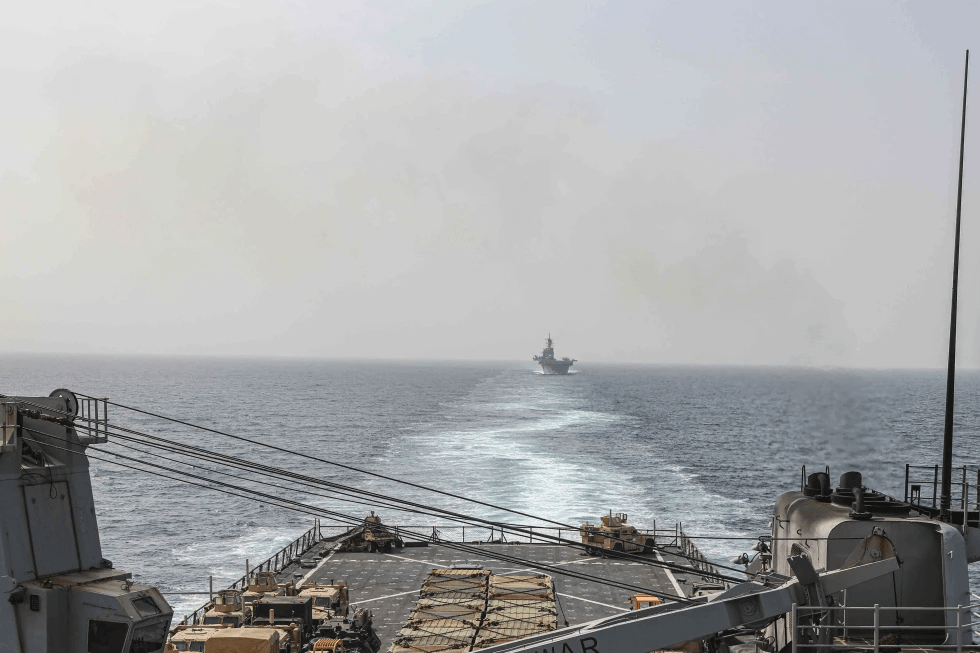
In a very dumb act of defiance, the Houthi political consultations head, Muhammad Abdel Salam, publicly dismissed the stern warnings issued by the ‘Prosperity Guardian‘ coalition of 13 nations, responding on a media platform despite the coalition’s significant mobilization of warships to safeguard maritime routes in the Middle East. Salam’s dismissive stance underscores the Houthis’ indifference to international concerns, especially those of the United States, about the escalating tensions in the Red Sea.
Abdel Salam’s rhetoric sharply criticized the American government, alleging that their concerns over Red Sea security are a smokescreen to detract attention from Israeli activities in Gaza. He boldly declared that increased militarization in the Red Sea by the U.S. would not deter Yemen’s commitment to supporting Palestinian resistance in Gaza, highlighting the group’s unwavering stance.
Further amplifying their defiance, Muhammad Ali al-Houthi, leader of Ansar Allah al-Houthis, issued a provocative demand. He insisted that ships traversing the Red Sea should display banners proclaiming their non-alignment with Israel. This demand, disseminated through the group’s military spokesman Yahya Saree on the X platform, was a direct challenge to American and allied naval activities in the area.
On January 6, 2024, the USS Laboon, a U.S. warship, was forced to shoot down a Houthi drone in self-defense, a clear indication of the direct threat posed by Houthi actions to international shipping and U.S. interests in the region. Timothy Lenderking, U.S. special envoy to Yemen, underscored the irony of the Houthi actions in an interview with Al Jazeera. He pointed out that the nations suffering from Houthi attacks are the same ones crucial to Yemen’s pursuit of security and stability.
In another concerning development, the British Maritime Trade Operations Authority reported an incident involving six small boats, likely Houthi-affiliated, menacing a commercial ship near Mokha. The situation, though resolved without confrontation, served as a stark reminder of the ongoing risks in these waters.
Ground operations in Yemen continue to be fraught with conflict. The Giants forces, opposing the Houthis, reported targeting Houthi military reinforcements headed to Shabwa Governorate. This operation, which inflicted significant losses on the Houthi forces, underscores the relentless and escalating nature of the conflict, presenting a continuous challenge to U.S. objectives in the region. Yemeni experts reported that
In related news, the United States has invited India to join Operation Prosperity Guardian, a multinational naval effort coordinated by the Combined Maritime Forces. India, a member of the Combined Maritime Forces, showed reluctance to join this specific U.S.-led coalition, with concerns over potential escalation of conflicts in the region. The Indian government expressed a strong interest in ensuring the free flow of commercial shipping, but prefers to maintain its own naval presence rather than integrating into the U.S.-led coalition. Egypt also refused to join the ‘Prosperity Guardian’ coalition citing threats to “the country’s national security especially with the possibility of a coalition naval fleet entering Egyptian ports.”
On Monday January 8, 2024, COSCO, the fourth largest container shipping line globally, halted its services to Israeli ports due to heightened tensions in the Bab al-Mandab Strait and the Red Sea. This decision follows Houthi group’s attacks on vessels bound for Israel, supporting Gaza amidst ongoing Israeli aggression. The move impacts trade between the Far East and Israel, potentially raising shipping costs due to a partnership with Israeli line “Zim ” and a shortage of ships. Haifa’s port, operated by another Chinese firm, SIPG, also faces challenges as it depends on COSCO ships. This situation has significantly reduced activity at Israel’s Eilat port and affects global trade, including oil and liquefied gas, passing through the Suez Canal.
======================
★ IRAQ
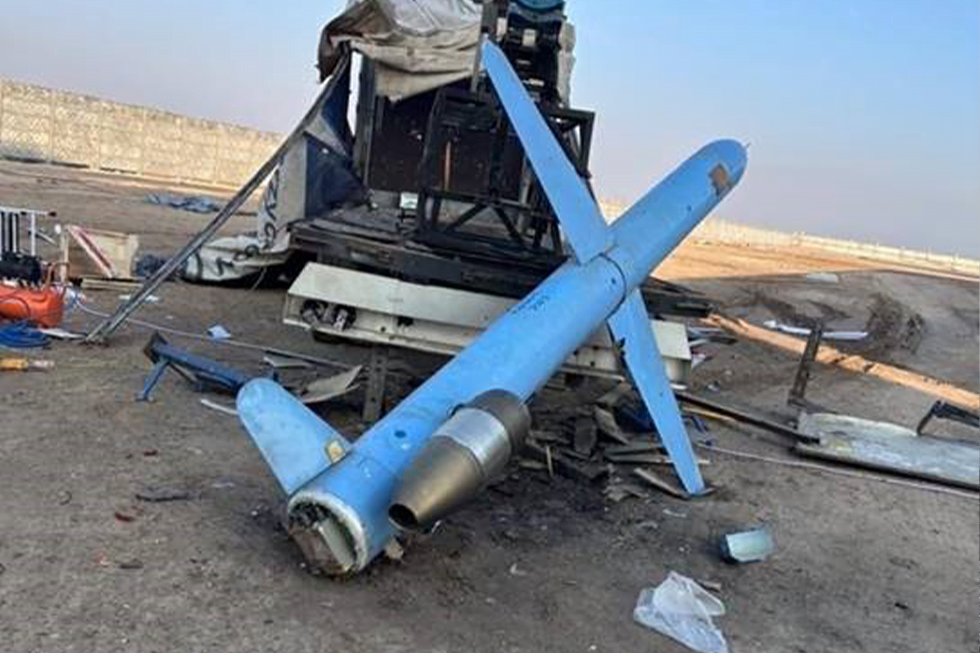
The US drone strike in Baghdad that targeted Abu Taqwa al-Saidi, a senior leader of the Al-Nujaba Movement, an Iraqi armed faction with strong ties to Iran which came after Iraqi police announced discovering an Iranian-origin, failed to launch cruise missile has become a focal controversy in Iraq’s internal politics.
US National Security Council spokesman John Kirby, while withholding details, stressed the United States’ appreciation for the Iraqi government’s support in protecting US forces, highlighting Washington’s respect for Iraqi sovereignty. This stance appears to have intensified internal tensions between the Iraqi government and the Iranian-backed militia, Al Hashad.
Consequently, Iraqi Prime Minister Sudani publicly pledged to accelerate the withdrawal of international coalition forces. During a memorial for Abu Mahdi al-Muhandis, the deceased deputy head of the Popular Mobilization Forces, al-Sudani declared the coalition’s presence in Iraq as no longer necessary, announcing plans for discussions to finalize the withdrawal. Al-Sudani also condemned repeated coalition assaults on Hashd headquarters, emphasizing the Hashd’s official status within the state and its essential role in the armed forces.
For the second consecutive day, on January 5, 2024, Iraqi armed factions targeted American bases in Syria with drone missiles. A statement from the “Islamic Resistance in Iraq” factions attributed the attack to retaliation against “Israel’s massacres in Gaza,” vowing continued strikes on American bases.
======================
★ SYRIA
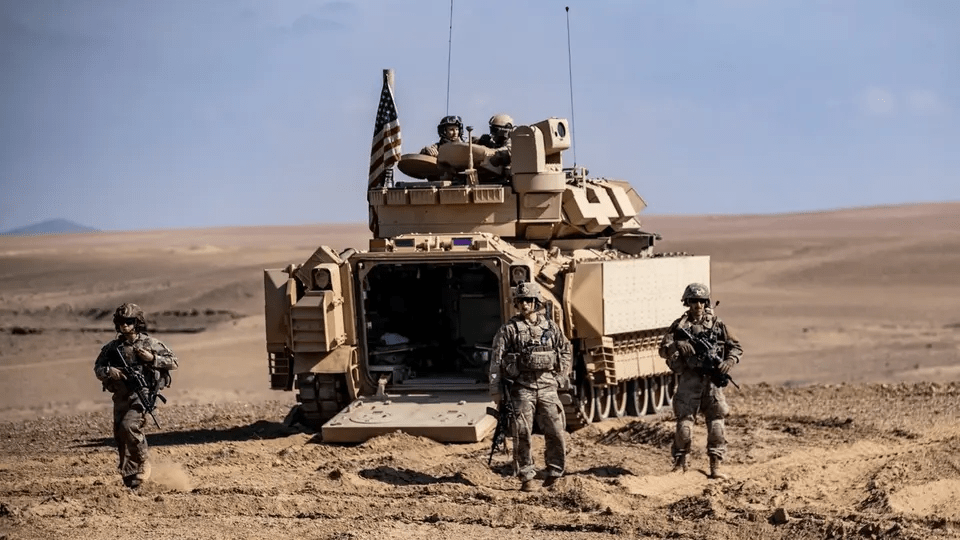
Urgent Military Update: Escalation Against American Forces in Syria
In a concerning development, whether the United States acknowledges it or not, Iran, via its alliances in Iraq and Syria, is actively waging a full-scale war against American forces. Since January 5, 2024, this conflict has seen a notable escalation. American bases in Syria and Iraq, specifically the Al-Harir Air Base in Erbil, Iraq, and the Al-Shaddadi base in eastern Syria, have been targeted by drones, with Iraqi armed factions claiming responsibility.
Located in eastern Syria’s Hasakah countryside, the Al-Shaddadi base, which hosts Western military personnel including French and British, stands as one of the largest American bases. Witnessing over 100 attacks using missiles and drones on American and international coalition forces since mid-October, this base has become a focal point of conflict.
The attacks continued on January 6, Iraqi factions, for the second consecutive day, targeted American bases at Al-Tanf and Al-Shaddadi in Syria with drones. They also struck the Rukban camp in southern Syria and the Al-Omar oil field in the east. Following these drone attacks, the Syrian Observatory for Human Rights reported casualties at Al-Omar field.
Transitioning to January 7, a drone, likely operated by American forces, struck a small single truck in Deir ez-Zor, injuring two members of pro-Iranian factions. The Syrian Observatory observed violent explosions in areas controlled by Iranian loyalists in Deir ez-Zor. Meanwhile, Iraqi factions claimed responsibility for bombing a military target in the southern Syrian Golan Heights and the American Qasrak base in the northeastern Hasakah countryside.
Moving into January 8, the situation intensified. Militants from factions loyal to Iran bombarded the Al-Omar oil field base in the Syrian Golan Heights and the American Qasrak base in Deir ez-Zor with thirty rocket missiles. Iranian media immediately highlighted this attack as a response to the ‘US aggression’ that targeted the truck earlier.
It’s evident, for any average learner of the region, even those without military expertise, that the response — or rather the lack of protective measures — promised by President Biden to safeguard American forces has been weak, modest, and inadequate. This is in stark contrast to his recent declaration that protecting American forces is a top priority. The Pentagon reports more than 60 casualties since the Israel-Hamas war. Although these attacks are typically attributed to Iranian-backed militias, Iran has consistently denied any direct involvement. As the situation continues to remain volatile and fluid, and given the frequency and intensity of these attacks, it’s noteworthy to mention that no official American statements have been reported yet. This ongoing silence, coupled with a modest military response, is raising alarm among America’s allies and, more critically, within the families of American service members in the region. These growing concerns underscore the urgent need for clear, decisive action from the Biden administration to address the escalating violence in Syria and Iraq, and to ensure the safety of American personnel.
In another very significant and related development, the Russian Ministry of Defense has escalated its presence near Israel. Establishing two new military observation points in Quneitra Governorate, adjacent to the Israeli-occupied Golan Heights, Russia aims to monitor the ceasefire in this tense region. Vadim Collet, Deputy Head of the Russian Reconciliation Center at Hmeimim, cited increased provocations in the demilitarized zone as the reason for this escalation, as reported by the TASS news agency. These points, operated by Russian military police and located near Al-Mu’allaqa and Nasiriyah in Quneitra, were recently disclosed by Russian military-affiliated channels. This move follows an Israeli raid near Damascus that killed Iranian General Radhi Mousavi, escalating Iranian threats of retaliation and a surge in security incidents in the Golan Heights, including Israeli responses to Syrian missile launches and drone intrusions. Although the Golan Heights have generally been stable, these recent developments have prompted ongoing discussions about revisiting the 2018 Syria settlement terms. These terms include relocating Iranian militias away from the Golan borders and reducing arms supplies to the Syrian opposition, with Russia overseeing the enforcement of these agreements.
Lastly, the Jordan-Syria Border Clashes have also intensified greatly this weekend, as part of Iran’s silent war on the region through the Assad regime. Jordanian forces engaged in a series of battles with armed groups along the Syrian border, leading to the deaths of five individuals, the arrest of 15, and one injury. Occurring near the Eastern Military District of Jordan’s northern border, these confrontations resulted in the seizure of significant quantities of drugs and a firearm. Jordanian officials attribute the increase in smuggling activities to the weakened authority in Damascus and the influence of regional tensions, notably Iran’s expansion in the area. Responding forcefully, the Jordanian government has launched airstrikes targeting suspected smuggler locations in Syria, including raids on a water well and a residential area. This situation reflects broader regional security concerns, with allegations of political motives behind the smuggling operations. In other news related to Jordan, Israel views Jordanian Foreign Minister Ayman Safadi as a provocateur due to his statements during the Gaza war. Israel, valuing its strategic relationship with Jordan, sees Safadi’s actions and statements, including supporting South Africa’s genocide lawsuit against Israel, as inconsistent with these relations. This stance has led to perceptions of Jordan as an unserious regional player. Safadi’s rhetoric includes accusing Israel of aggression and racism towards Palestinians in Gaza.
======================
★ EGYPT

The U.S. congressional delegation inspected the Egyptian Rafah crossing, observing the process of aid delivery to Gaza, but did not enter the Gaza Strip’s side to actually witness the horrific atrocities of 1.3 million people in a geographic area not larger than 60 km total.
Negotiations between Egypt and Israel regarding the Gaza-Egypt border, specifically the Philadelphia axis, have faltered. Discussions involved advanced security measures like underground sensors and surveillance but stopped over sovereignty issues. Concurrently, a Palestinian-Egyptian summit was held in Cairo to discuss coordination ahead of US Secretary of State Blinken’s visit to Ramallah.
The significance of this issue has escalated amidst regional tensions and the presence of US Secretary of State Blinken in the Middle East. His visit, which includes stops in Jordan, Qatar, the UAE, Saudi Arabia, Israel, and the West Bank, is focused on addressing the conflict’s spread, increasing humanitarian aid, and planning for Gaza’s future. In this context, the Philadelphia Axis negotiations and the Palestinian-Egyptian summit in Cairo are pivotal in shaping the regional security landscape and diplomatic relations.
In addition to discussing coordination before US Secretary of State Blinken’s visit to Ramallah, the Palestinian-Egyptian summit in Cairo, involving Presidents Mahmoud Abbas and Abdel Fattah El-Sisi, also focused on reconciliation efforts between Hamas and the Palestinian Authority. This meeting aimed to explore avenues for establishing a unified Palestinian government, an essential step towards addressing the longstanding internal political divisions. The summit’s timing was strategic, occurring just before Blinken’s Middle East tour, underscoring its significance in setting the stage for subsequent diplomatic engagements.
New tensions surfaced in the Horn of Africa, centered around Ethiopia’s agreement with Somaliland for access to the Berbera port on the Red Sea. Egypt, expressing concerns for regional stability and sovereignty, has rejected this agreement, emphasizing the importance of Somali unity and sovereignty. Turkiye, through President Erdogan, has also voiced concerns, advocating for Somalia’s territorial integrity and offering support against terrorism. Turkiye’s Foreign Ministry expressed concern over Ethiopia and Somaliland partnership agreement, emphasizing support for Somalia’s sovereignty. Meanwhile, Ethiopian Prime Minister Abiy Ahmed signed a MoU with Somaliland, allowing Ethiopia Red Sea access via Berbera Port, which Somalia views as a sovereignty violation.
The agreement raises broader geopolitical concerns, particularly affecting Egypt’s position in the region and its ongoing dispute with Ethiopia over the Nile waters and the Renaissance Dam. Experts highlight the potential impact of Ethiopia’s Red Sea presence on regional trade and navigation, including the strategic Bab al-Mandab Strait and the Suez Canal. The situation underscores the intricate balance of power and the delicate nature of regional stability in the Horn of Africa.
======================
★ THE ARABIAN GULF
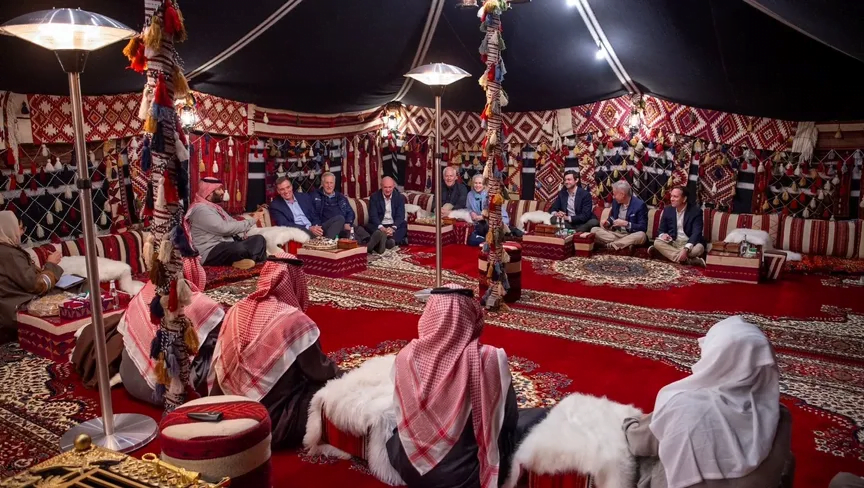
The U.S. State Department’s approach to Saudi Arabia and Qatar illustrates a contrasting nature in American foreign policy in the Gulf Region. On one hand, the U.S. has continued to place Saudi Arabia on its religious freedom sanctions list, alongside nations like China and North Korea, for systematic violations of religious freedoms. This decision comes despite recent high-level diplomatic interactions, such as the U.S. Senate Intelligence Committee, led by Senator Mark Warner, meeting Crown Prince Mohammed bin Salman in Al-Ula to discuss bilateral relations. The contrast between sanctioning Saudi Arabia for religious issues and engaging in diplomatic dialogues with its leaders underscores contradictory aspects of U.S. foreign policy.
In contrast, U.S. relations with Qatar, particularly in light of recent regional tensions, have been more collaborative. Secretary of State Antony Blinken’s fourth visit to the region post the October 7 Hamas attack on Israel was notably highlighted in Qatar. In a press conference with Qatari Prime Minister Mohammed Bin Abdulrahman Al Thani, Blinken expressed deep concerns about escalating tensions. He echoed Admiral Gary Roughead’s warnings about the critical maritime situation in the Middle East and confirmed the full commission of operation Prosperity Guard. Additionally, Blinken committed to facilitating aid to Gaza and exerting efforts to release hostages held by Hamas. He also condemned certain Israeli ministers’ statements regarding the forced exile of Gazans.
Parallel to these diplomatic efforts, Qatar’s invitation to the families of six American and Israeli detainees showcased its significant role in addressing regional conflicts. Qatari Prime Minister Mohammed bin Abdulrahman Al Thani personally extended this invitation, emphasizing Qatar’s dedication to resolving the hostage situation and its role as a mediator, particularly in the challenging context following the assassination of Saleh Al-Arouri. This gesture not only highlighted Qatar’s active diplomacy but also its commitment to open communication with all parties, including affected families.
======================
★ TURKIYE
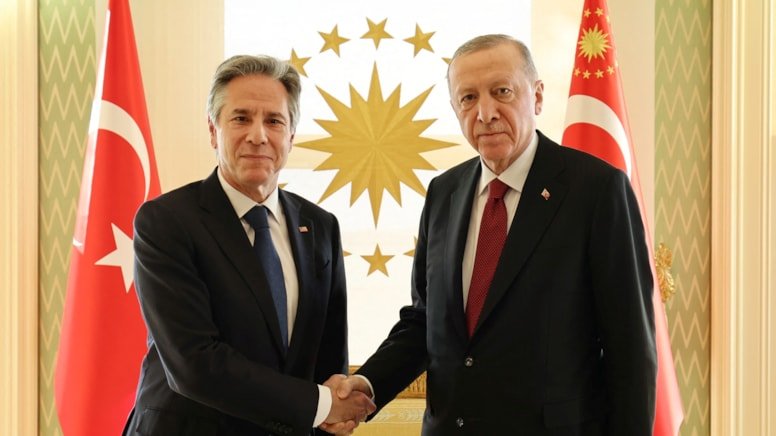
Turkiye’s mercurial approach continues to effectively position it as a key player in both regional and international arenas. High-level diplomatic engagements, economic developments, military-navy exercises, and complex internal security challenges are navigated smoothly by the Turkish government to maintain its strategic posture.
Secretary Blinken’s visit to Turkiye and the two-hour meeting with his Turkish counterpart, Mr. Hakan Fidan, followed by a one-hour meeting with President Erdogan, were greatly highlighted in the Turkish media. The discussions focused on Gaza, the finalization of the F-16 sale, Sweden’s NATO bid, and tensions in the Black Sea.
Simultaneously, President Erdogan called President Zelensky to host new peace talks between Ukraine and Russia regarding the crucial Black Sea grain corridor and emphasized the need for hostilities in both Ukraine and Palestine to stop.
Turkiye, barred from the F-35 program due to its S-400 purchase from Russia, applied for 40 F-16s from the US, with the decision pending in Congress. The Biden administration used this sale as leverage over Sweden’s NATO membership, leading Turkiye to alternatively negotiate for the Eurofighter Typhoon, a joint venture of Britain, Germany, Spain, and Italy. Despite positive talks with Britain and Spain, Germany initially resisted due to EU sanctions and Eastern Mediterranean disputes. However, Germany reversed its stance, lifting a six-year embargo on Eurofighter sales to Saudi Arabia, prompted by fears of being excluded from the program as Saudi Arabia showed interest in French military equipment. This shift reopened prospects for Turkiye’s Eurofighter purchase, with England, Spain, and Italy appearing ready to proceed, increasing the pressure on Germany to conform with its Eurofighter partners.
On the economic front, Turkiye’s agreement with the UK to develop a $1.3 billion high-speed electric railway marks a significant step in enhancing Turkiye’s low-carbon transport network. This project, coupled with discussions on a potential trade deal upgrade, not only reflects Turkiye’s growing economic ambitions but also its strategic importance as a partner in sustainable development and broader economic cooperation. Turkiye is set to meet with 200 US investors, managing funds totaling $50 trillion, following its recent economic success. This meeting, a first for the Central Bank of the Republic of Turkiye, will take place on January 11 in New York. Treasury and Finance Minister Mehmet Şimşek and Central Bank Governor Hafize Gaye Erkan will attend, discussing topics like inflation and monetary policy. Major investment firms like JP Morgan, Goldman Sachs, and Blackrock will participate, highlighting increased foreign interest in Turkiye’s economy.
In terms of military preparedness, Turkiye’s announcement of the Seawolf-1/2024 naval drill demonstrates a robust commitment to defense and operational readiness. Spanning the Black Sea, Aegean Sea, and Eastern Mediterranean, this exercise underlines Turkiye’s concerns about securing its maritime domains and enhancing interoperability among its naval forces. Perhaps what Turkiye is trying to show is that it can be an excellent partner in the United States’ mission to guard the Maritime Middle East. However, the United States was not reported to have asked Turkiye to join Operation ‘Prosperity Guardian’.
Despite Turkiye’s public condemnation of Israel, a striking contradiction was revealed in its trade relations. Activist Metin Ceyhan, through his “Stop shipping to Israel” campaign, uncovered information that high-ranking Turkish figures, possibly including President Erdogan’s son, are involved in clandestine trades with Israel. This starkly contrasts with Turkiye’s official stance and its boycotts against companies accused of supporting Israeli aggression. Nonetheless, trade data paints a different picture. In December 2023, Turkish exports to Israel saw a significant increase of 30.4%, amounting to $393.3 million, with annual exports reaching $5.1 billion. Key sectors in this trade include steel, chemicals, and automotive, with Turkiye being a major supplier of steel to Israel and also acting as a conduit for Azerbaijani oil imports. This situation demonstrates that Turkiye’s economic interests take precedence over political and ideological differences.
Two intriguing stories regarding Israel, the PKK, and Syrian refugees were reported in the media this weekend. The first, published by Turkiye Gazette, alleges Israeli support for the PKK, a group designated as a terrorist organization by Turkiye and several other countries. This support allegedly includes facilitating PKK activities in Gaza against Hamas and conspiring with Mossad and DAESH to frame Arab-origin individuals in Turkiye. A recent visit by an Israeli team to Syria, purportedly to assist the PKK in filing compensation lawsuits against Turkiye for damages during military operations, has exacerbated tensions. This action is perceived as an attempt to legitimize the PKK and internationalize their autonomy project. Additionally, a fraudulent report, allegedly prepared in collaboration with the PKK by Israel, claims damages of $100 billion due to Turkish operations. This report, shared with Israeli-supported NGOs in the USA, is seen as laying the groundwork for compensation lawsuits against Turkiye. Reports of Israeli Foreign Minister Eli Cohen’s activities, including meetings with PKK leaders and discussions about UAVs and NATO membership, are viewed by Ankara as strategic moves against its interests.
The second story involves Turkish intelligence conducting a significant operation against individuals suspected of spying for Israel’s Mossad. In this sweeping operation, 34 individuals, primarily Palestinians, Syrians, and Iraqis, were arrested across eight states, predominantly in Istanbul. These detainees are accused of gathering intelligence on foreigners and institutions of interest to Israel. The operation uncovered that 46 agents, allegedly working for Mossad, entered Turkiye under tourist visas and secured residence by purchasing property. These agents were involved in plans to target and potentially kidnap Palestinians and their families in Turkiye. The discovery of money and digital materials during raids shed light on the intricate espionage network. This operation, including a related incident in Malaysia involving the rescue of a Palestinian programmer from Mossad’s custody, highlights Turkiye’s vigilance and stern approach towards foreign espionage activities, particularly concerning its regional rival, Israel.
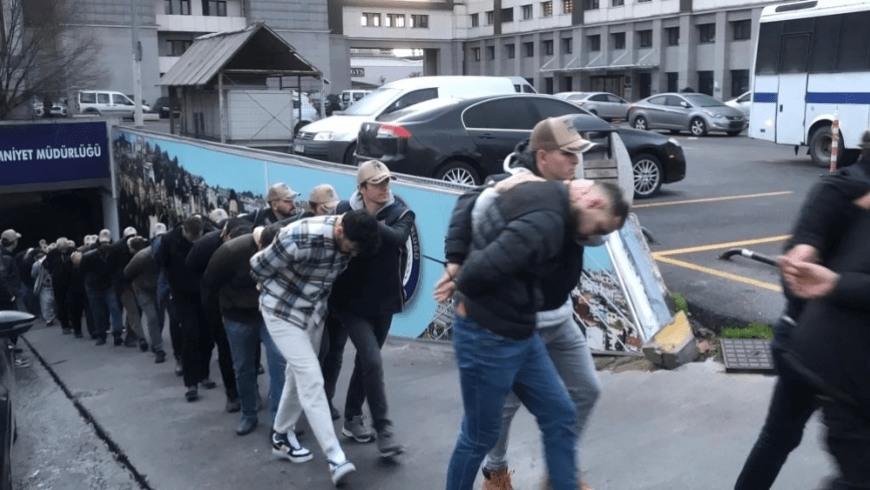
These separate narratives further demonstrate Turkiye’s often contradictory approach to international relations and internal security. While economic prosperity remains a paramount concern, leading to continued trade with Israel despite political tensions, Turkiye simultaneously takes aggressive stances against perceived threats and espionage activities. Erdogan’s management of these issues reflects the challenges of balancing economic interests with national security and political ideology, particularly in a region as volatile and complex as the Middle East.
======================
📌 Incase you missed it,
📰 THE EARLY PHOENIX January 4, 2024
📰 THE EARLY PHOENIX January 3, 2024
✒️ Listen to the Voice of the People Latest:
🔗 After October 7, is Jordan in Tehran’s Crosshairs?
🔗 Follow the latest news from the American Center for Levant Studies via Google News
======================


